Thank you, Anne Friedberg
Digital Humanities, Remembrances,
10/16/09
I wanted to take a moment to acknowledge Anne Friedberg, a brilliant scholar I had the privilege of collaborating with on a project called “The Virtual Window Interactive,” a companion piece to her book The Virtual Window: From Alberti to Microsoft. Anne passed away a week ago today.
In the brief time during which I worked with Anne, I found her to be not just a brilliant thinker, but a wonderful collaborator with an infectious enthusiasm for the potential of the field. “The Virtual Window Interactive” was one of those rare projects which almost seemed to design itself, as if the ideas Anne had been exploring were anxiously awaiting just this kind of outlet. The inherent visual qualities of Anne’s subject matter, the excitement she had for the medium, and the depth and clarity of her analysis made the project a real pleasure to develop.
Most of our real-time contact during the project was via three-way videoconferences between Anne, Steve Anderson (who orchestrated our meeting and facilitated the project) and myself. I had a habit of taking screenshots during these calls, and thought I’d share an image of one of our lighter moments (see below). I remember Anne being intrigued by the “windows” of the videoconferencing interface itself; throughout the development of the project she was keen to stay abreast of the dizzying changes happening in screen space and wanted the piece to speak to those changes as much as possible.
Others have reflected more thoroughly on the breadth of Anne’s considerable contributions to her field and the positive impact she had on those who knew her personally. I didn’t know Anne well, but I’m grateful for even the brief chance I had to work with such a remarkable person. Thank you, Anne.
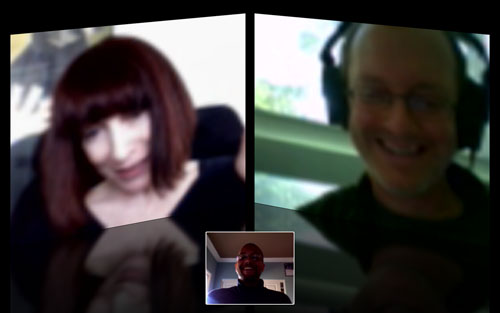
Anne Friedberg, Steve Anderson and I on a videoconference during the production of “The Virtual Window Interactive.”
Pictures at an exhibition: Blood Sugar at UCLA
Digital Humanities, Events, Flex, Wii,
2/2/09
Just wanted to share a few snapshots taken just prior to the opening of the installation of Blood Sugar at the UCLA Art | Science Center (the exhibit runs through February 20). The event went quite well—people seemed to really be engaging with the content of the piece, and we got lots of positive feedback about the use of the Wii remote and nunchuk as controllers. “Feels like Minority Report,” one visitor commented.
One interesting tip that might be of use to other folks wanting to create Wii remote-driven installations using the sensor bar: we found that stacking two sensor bars one on top of the other resulted in significantly more reliable pointer control.
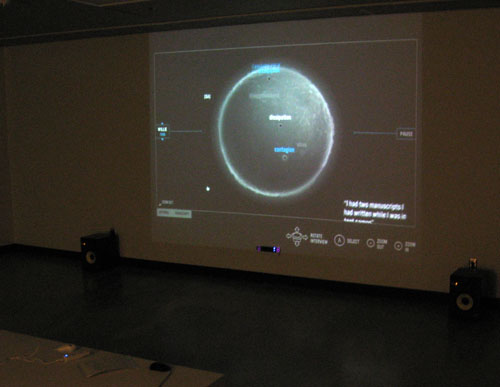
Just before the opening.
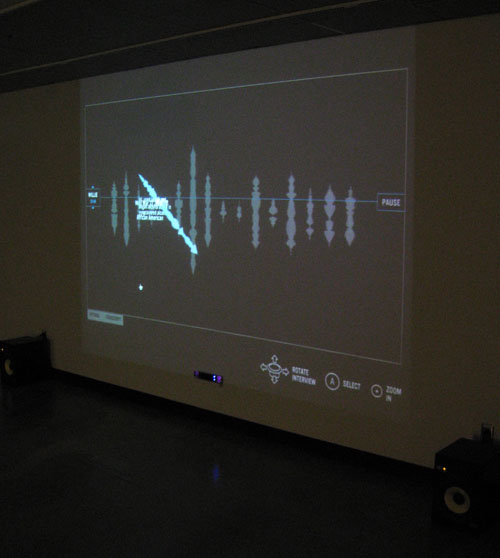
You can see the two stacked sensor bars here.
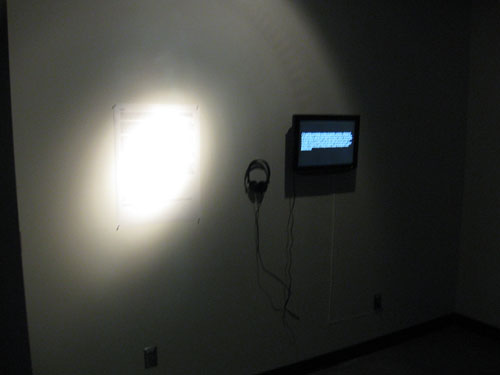
A DVD station provides context for the piece.
Wii remote-enabled documentary Blood Sugar to debut this Thursday (1/29) at UCLA
Announcements, Digital Humanities, Events, Flex, Wii,
1/28/09
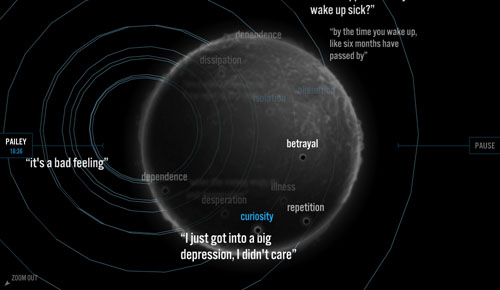
A screenshot from Blood Sugar.
This Thursday, January 29 from 5:00 - 7:00 pm, UCLA’s Art | Science Center & Lab [directions] is hosting an opening reception for a three-week exhibit of two documentary projects by Sharon Daniel: Public Secrets and the forthcoming Blood Sugar—any interested Angelenos are welcome. I worked with Sharon designing and programming both projects. Here’s a description of Blood Sugar:
Blood Sugar is a “new media documentary” that examines the social and political construction of poverty, alienation, and addiction in American society through the eyes of those who live it. Blood Sugar provides an interactive interface to an audio archive of conversations with 24 current and former injection drug users recorded at the HIV Education and Prevention Program of Alameda County and in California state prisons. Since addicts must fear encounters with regimes of enforcement, they are afraid to be seen-but they do want to be heard. Theirs are the most important voices in the discourse around addiction, public health, poverty and belonging in America. Through the stories of those most affected by addiction, Blood Sugar challenges us to address question such as, what is the social and political status of the addicted? Is the addict considered fully human, diseased, possessed or wholly “other” and thus rendered ideologically appropriate to her status as less than human?
Barring technical issues, you’ll be able to navigate Blood Sugar with a Wii remote and nunchuk at the opening, which makes for quite an immersive experience. We’d love to see you there.
Recent Posts
Go InSight: Composing a Musical Summation of Every Mission to Mars (Part 2)
Making music out of the data of interplanetary exploration.
Go InSight: Composing a musical summation of every mission to Mars (Part 1)
Making music out of the data of interplanetary exploration.
Cited Works from “Storytelling in the Age of Divided Screens”
Here’s a list of links to works cited in my recent talk “Storytelling in the Age of Divided Screens” at Gallaudet University.
Timeframing: The Art of Comics on Screens
I’m very happy to announce the launch of “Timeframing: The Art of Comics on Screens,” a new website that explores what comics have to teach us about creative communication in the age of screen media.
The prototype that led to Upgrade Soul
To celebrate the launch of Upgrade Soul, here’s a screen shot of an eleven year old prototype I made that sets artwork from Will Eisner’s “The Treasure of Avenue ‘C’” (a story from New York: The Big City) in two dynamically resizable panels.
Categories
Algorithms
Animation
Announcements
Authoring Tools
Comics
Digital Humanities
Electronic Literature
Events
Experiments
Exemplary Work
Flash
Flex
Fun
Games
Graphic Design
Interactive Design
iPhone
jQuery
LA Flash
Miscellaneous
Music
Opertoon
Remembrances
Source Code
Typography
User Experience
Viewfinder
Wii
Archives
July 2018
May 2018
February 2015
October 2014
October 2012
February 2012
January 2012
January 2011
April 2010
March 2010
October 2009
February 2009
January 2009
December 2008
September 2008
July 2008
June 2008
April 2008
March 2008
February 2008
January 2008
November 2007
October 2007
September 2007
August 2007
July 2007
June 2007